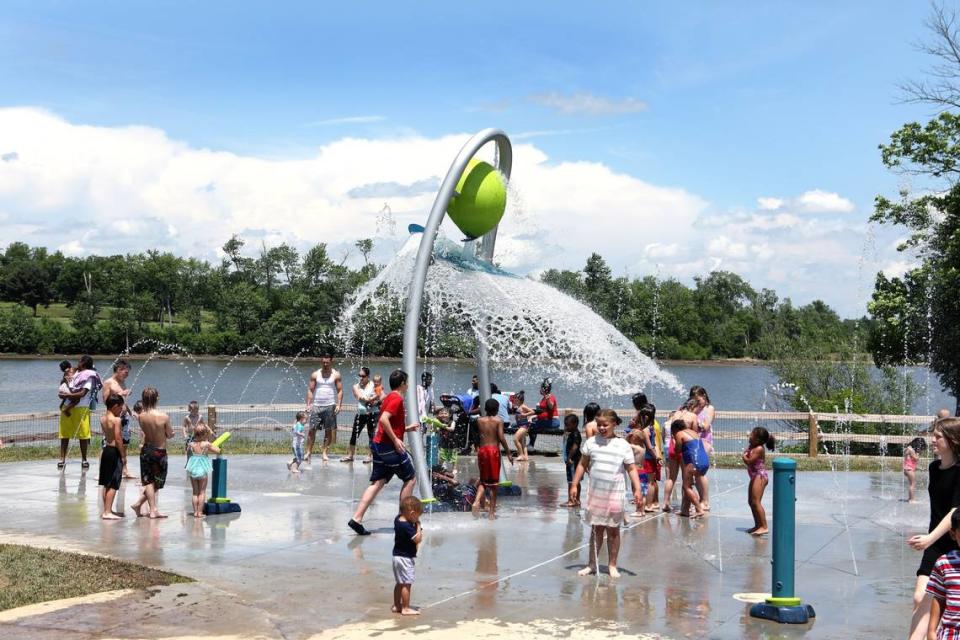Could you pay more in taxes for Lexington park improvements? An election may decide
A newly formed nonprofit wants a local ballot measure to generate up to $8 million a year in local taxes for improvements to Lexington’s more than 100 parks.
Parks Sustainable Funding, which has been started to drum up support for a tax referendum, officially announced its campaign on Tuesday.
“We stand at the threshold of a historic moment for Lexington. If passed, this ballot measure would bring about the most significant improvement in quality of life in our city in a generation, ensuring that our parks remain vibrant, safe and inclusive spaces for all residents for years to come,” said David Lowe, one of the Parks Sustainable Funding organizers.
Under the proposed referendum, property owners would be taxed 2.25 cents per $100,000 of taxable property. For an average homeowner that would translate to an additional $52.88 per year in property taxes.
According to calculations, that would generate approximately $8 million per year for capital improvements.
Victoria Meyer, who chairs the city’s Parks and Recreation Advisory Committee, said there have been prior efforts to get a local tax referendum passed but those efforts were abandoned to allow a referendum on public transportation to move forward.
The parks advisory committee is an all-volunteer committee that helps guide park decisions.
Meyer and Lowe said the city’s public parks are one of the most-used public assets.
A 2018 parks master plan showed 90% of Lexington residents use public parks. More than 57% of Fayette County residents visit or use parks at least once a month, according to the master plan. That parks master plan also showed the city needed $100 million in upgrades and improvements, or funding of roughly $5 million a year.
City officials are not directly involved in the effort.
“Through this proposal, Lexington residents will have the opportunity to make an important decision about investing in their parks,” said Susan Straub, a spokeswoman for the city of Lexington. “We encourage residents to learn about the issue so they are prepared to make an informed choice. Thank you to the citizen volunteers who are working to put this issue on the ballot. They have spent many hours studying the needs and putting together a thoughtful proposal for the community’s consideration.”
How parks are currently funded
The city has used more than $24.6 million in American Rescue Plan Act funding for a host of parks improvements, including the building of Cardinal Run North, a large, regional park off of Versailles and Parkers Mill roads which is currently under construction.
But the federal coronavirus relief money has now been exhausted.
Yet, Cardinal Run North, as well as Kelly’s Landing, a new park under construction on the Kentucky River, will need other capital improvements after the ARPA funding runs out, park officials have said.
Then there’s ongoing maintenance and upkeep. For example, the city borrowed $2.1 million this year to reconstruct Douglass Pool, which has had near-constant repairs over the past few years.
Lowe said state law requires the money generated from the local tax to remain in the capital parks funding budget. The city can’t use that money to buy fire trucks or dip into it to pay salaries of employees, Lowe said.
Still, the money generated would only pay for capital projects. The city’s general fund would still have to cover the operating and personnel expenses of the city’s parks and recreation department. The department’s total budget for the current fiscal year is $27 million, according to budget documents.

The city borrowed or used bond funds for $4.1 million for parks capital improvements this year on top of general fund and surplus money to pay for repaving of parking lots, constructing or replacing playgrounds, and building pickleball and other sport courts.
“If we don’t have to borrow, that will allow the city to use that bond money for other projects,” Meyer said. “We would rather pay as we go than borrow, which is more costly.”
Lowe argued a designated tax for green spaces and parks is fiscally responsible.
“It’s not fiscally responsible to continue what we are doing,” Lowe said.
How a local tax referendum get passed
There are two ways a local tax referendum can get on a ballot for voter decision: through a petition or a council vote.
Parks Sustainable Funding will ask the Lexington-Fayette Urban County Council to vote sometime in March to put the referendum on the ballot in November. If the council passes the referendum, it will go on the Nov. 5 ballot.
The last time Fayette County residents got to vote on a local tax referendum was in 2004 when it approved a separate tax for Lextran. The bulk of all property taxes goes to the Fayette County Public School System and the state. Other property taxing districts include the Fayette County Health Department, the soil and water conservation district and the Fayette County Cooperative Extension Service.
Lexington has not raised its portion of property taxes in decades, according to city records. It separates taxing districts for certain types of city services. It recently raised a tax for street lights. Roughly 100,000 Fayette County property owners paid the increase.

